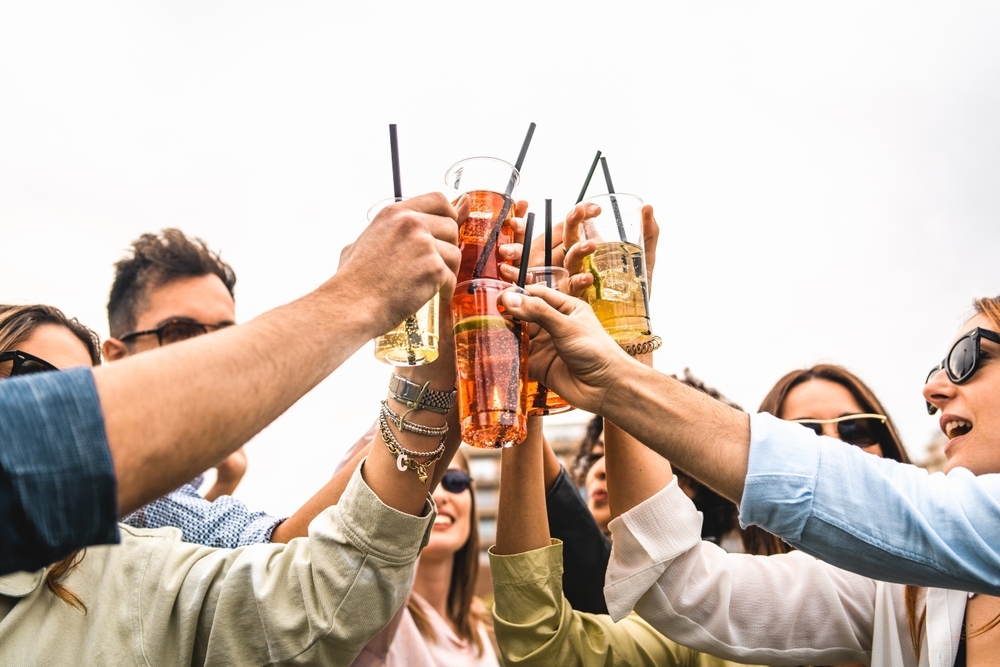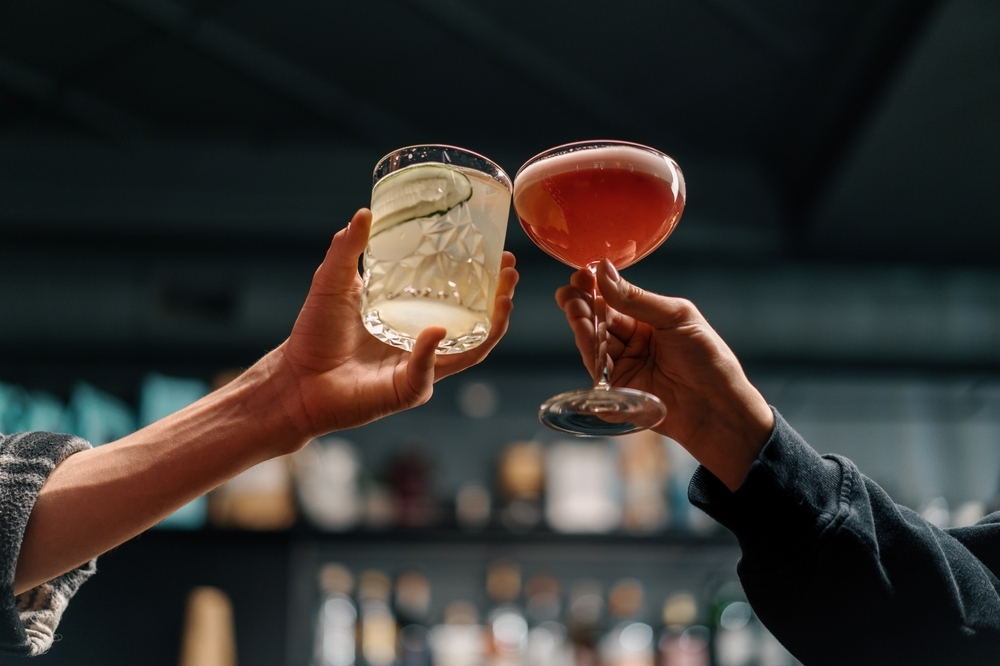Last Updated:
March 4th, 2025
In recent years there has been an explosive shift toward sober living and mindful drinking, with more people than ever seeking alternatives to alcohol. The booming growth of the alcohol-free market, dubbed ‘NoLo,’ has garnered significant support from celebrities in Hollywood.
Trends are evolving and movements are gaining traction, leading people to reevaluate their relationship with alcohol and prioritise their well-being. In this article, we’ll look at some of the celebrities leading the charge and how they’re making alcohol-free living more accessible, desirable and mainstream.
The rise of alcohol-free living
In the early 2000s, alcohol-free drinks were in a smaller, niche market. Limited shops sold a handful of 0% alcohol choices that roughly imitated the taste of their alcoholic counterparts.
Today, the options for non-alcoholic drinks have grown dramatically. According to market research, the no- and low-alcohol sector is currently valued at a staggering $13 billion and will deliver incremental growth of $4 billion by 2028. With more premium options than ever, mindful drinkers can now try alcohol-free wines, beers and spirits.
As sobriety becomes more socially accepted and even celebrated, a wider audience is being inspired to lead a life free from alcohol. The involvement of high-profile names and the expected growth of the industry indicates it’s not a trend; it’s a cultural shift that’s here to stay.
Which celebrities are invested in non-alcoholic products?
The shift toward mindful drinking is gaining momentum. Celebrity names are now not only advocating for sober lifestyles, but they’re also stepping into the endorsement and production of alcohol-free products.
Using the reach and leverage of their platforms, they’re helping to reshape perceptions of sobriety and inspiring more people to explore mindful drinking. Here’s a closer look at some of the key figures driving this shift and the products they’re backing.
Bella has been vocal about her choice to reduce her alcohol consumption, saying that it’s been transformative for her mental and physical health. Kin Euphorics focuses on adaptogens and nootropics in drinks that calm the mind. Her advocacy has helped normalise alcohol-free lifestyles, especially among younger audiences who aim to drink less.
He stated how the UK has a “huge drinking culture” and how he faced struggles reflecting during a 2022 Dry January attempt. “I don’t think I realised how big a problem I had when it comes to alcohol until I gave it up,” Holland said in an interview. Bero is making non-alcoholic options more accessible and appealing with attractive golden branding and a broad choice of flavours.
Almave is made using high-quality blue agave plants. The production process mirrors that of tequila with the harvesting and crushing of agave piñas. The brand currently has two products, Almave Ámbar intended to be sipped, and Blanco, to be mixed. The brand’s popularity reflects an increasing demand for premium, non-alcoholic drinks.
Despite not drinking, she has stated how much she values her social connection and enjoys being part of the occasion by having alcohol-free alternatives available. The drinks are marketed to complement spirits yet taste good enough to stand alone. Blake called mixers the “unsung heroes” of cocktails, deserving as much love and recognition as the alcohol they pair with; a great message for people seeking mindful drinking.
How younger generations are reshaping food and drink culture
The lifestyle choices of Gen Z (mid-teens to 28 years old) are driving a seismic shift in eating and drinking habits. Unlike previous generations, many young people aren’t tethered to the idea that alcohol is a default part of celebration and relaxation.
A recent survey shows how more than a quarter of 16- to 24-year-olds in the UK stay “teetotal” and avoid alcohol altogether. Many of them want to embrace socialising without alcohol. Celebrity involvement in this movement plays a significant role in driving this trend as they reflect the same priorities.
With health information waiting at their fingertips, Gen Z appears to be more aware of alcohol’s impact on their mental health and overall wellness. Research shows that Gen Z is more interested in opening up about mental health issues and seeking treatment or therapy.
It may be through therapy and open dialogue that Gen Z sees sobriety as a way to manage anxiety, improve sleep, and build emotional resilience. These values are echoed by the celebrities involved in alcohol-free trends who they admire.
What this means for addiction
The rise of celebrity-endorsed alcohol-free products is helping to create a culture where the stigma of addiction is reduced. Celebrities can give a public voice to the people who might feel unheard as they express the desire to reduce alcohol intake.
For people in recovery, having more high-quality, alcohol-free options available can make social situations less daunting. For many people who battle with addiction, changing and removing the triggers of “People, places and things” isn’t easy. Meeting a friend in a setting like a pub can make a person more likely to relapse. Just being around smells, colours, and even the sounds of tinkling glasses or corks popping can create urges to drink as they fight to stay sober.
Celebrities involved in the creation of alcohol-free products understand how their fame can influence public perceptions and inspire new conversations about addiction. We hope their endorsement continues to help new and old generations feel comfortable turning away from alcohol and finding alternatives.
Getting help with an addiction
If you or someone you know is battling with addiction, you know that staying sober can sometimes feel like an insurmountable challenge. Getting support at the right time is integral to long-term sobriety and avoiding relapse. We want to extend our hand and be there for you if you need professional support.
Here at UKAT, we specialise in complete recovery from drug and alcohol addiction. Our expert staff deliver comprehensive detox programmes that help you through every stage of the recovery process.
Getting the help you or a loved one needs is only a phone call away. Don’t hesitate to reach out to us and take the first step toward a healthier life free from alcohol.
(Click here to see works cited)
- Okaru AO, Lachenmeier DW. Defining No and Low (NoLo) Alcohol Products. Nutrients. 2022 Sep 19;14(18):3873. doi: 10.3390/nu14183873. PMID: 36145249; PMCID: PMC9506306.
- Bowes, Lauren. “No-and-Low Market Worth $13bn.” The Spirits Business, 19 Dec. 2023, www.thespiritsbusiness.com/2023/12/no-and-low-market-worth-13bn/.
- “Growth of $4bn+ Expected from No-Alcohol Category by 2028.” IWSR, 8 Jan. 2025, www.theiwsr.com/growth-of-4bn-expected-from-no-alcohol-category-by-2028.
- Andrea Tóth-Mészáros a, et al. “The Effect of Adaptogenic Plants on Stress: A Systematic Review and Meta-Analysis.” Journal of Functional Foods, Elsevier, 14 Aug. 2023, www.sciencedirect.com/science/article/pii/S1756464623002955.
- Malík M, Tlustoš P. Nootropics as Cognitive Enhancers: Types, Dosage and Side Effects of Smart Drugs. Nutrients. 2022 Aug 17;14(16):3367. doi: 10.3390/nu14163367. PMID: 36014874; PMCID: PMC9415189.
- “A Recent Survey Found That British Gen Z Are Going Booze-Free. .” YPulse, www.ypulse.com/newsfeed/2022/07/27/a-recent-survey-found-that-british-gen-z-are-going-booze-free/
- “Sociodemographic Determinants of Digital Health Literacy: A Systematic Review and Meta-Analysis.” International Journal of Medical Informatics, Elsevier, 10 June 2023, www.sciencedirect.com/science/article/pii/S1386505623001429?via%3Dihub.
- Bethune, Sophie. “Gen Z More Likely to Report Mental Health Concerns.” Monitor on Psychology, American Psychological Association, Jan. 2019, www.apa.org/monitor/2019/01/gen-z.
- “Why Change People, Places, and Things in Early Recovery?” Psychology Today, Sussex Publishers, www.psychologytoday.com/intl/blog/understanding-addiction/202106/why-change-people-places-and-things-in-early-recovery


